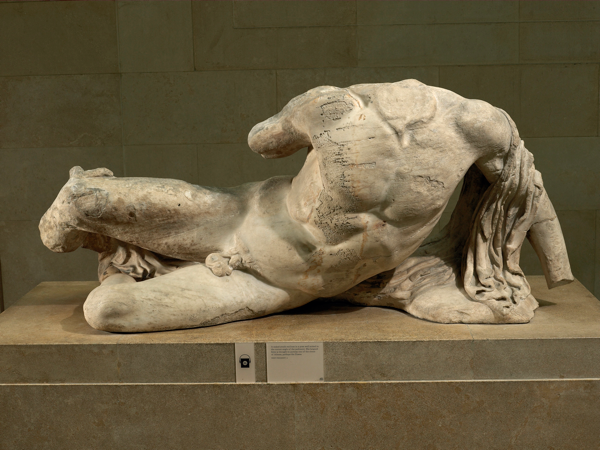Art & Exhibitions
Elgin Marble Loaned to Russia, While Greece Keeps Getting Snubbed
Shrouded in secrecy, the controversial loan was approved fifteen days ago.

Shrouded in secrecy, the controversial loan was approved fifteen days ago.

Lorena Muñoz-Alonso

The Elgin Marbles saga has entered yet another controversial chapter. The British Museum has announced that it has loaned one of the 2,500 year-old Greek sculptures to the State Hermitage Museum, where it will be unveiled tomorrow as part of the celebrations commemorating the 250th anniversary of the St. Petersburg museum.
The specific piece, which has left the UK for the very first time since the marbles arrived to the British Museum in 1816, is a headless reclining sculpture of the Greek river-god Ilissos, originally created for Athens’ Acropolis about 438-432 BC.
The loan has been shrouded in secrecy, and when the news hit the international media this morning, the general reaction was one of great surprise, given the heated debate surrounding the Elgin Marbles’ denied repatriation to Greece.
The Marbels’ History
The priceless collection of marble artworks was removed from the Parthenon in Athens between 1801 and 1812 by Lord Elgin, during his time as ambassador to the Ottoman Empire. He then brought the items back to the UK, where he sold them to the British Parliament in 1816. The Marbles have been displayed in the British Museum ever since.
In the last few decades, the marbles have been the subject of frictions between the British Museum and the Greek government, which has issued several (unsuccessful) petitions requesting their repatriation. The latest one was supported by the international rights lawyer (and celebrity) Amal Alamuddin-Clooney.
But what is perhaps more surprising about this loan is its specific recipient: Russia, whose diplomatic relations with the UK have got to rather frosty point this year, following Russia’s invasion of eastern Ukraine and the attack on Malaysia Airlines flight MH17 last July, which killed 298 people.
While fear-mongering rumors of an impending new Cold War between Russia and the West have been consistently dismissed, only last month British Prime Minister David Cameron, referring to the Ukraine crisis,told the BBC: “If Russia continues on its current path, then we will keep upping the pressure and Russia’s relationship with the rest of the world will be radically different in the future.”
A Diplomatic Limb
But it seems that the British Museum has gone out on a diplomatic limb. Neil MacGregor, director of the British Museum, told the Times: “The politics of both museums have been that the more chilly the politics between governments, the more important the relationship between museums.” He also argued that the Hermitage and the British Museums are “almost twins, they are the first great museums of the European Enlightenment.”
According to the Telegraph, the loan to Russia was only approved 15 days ago, with Sir Richard Lambert, chairman of the British Museum’s trustees, declaring that they had wanted to “leave room for flexibility if the political relationship between Western Europe and Russia changed.”
While the controversial loan might benefit diplomatic relations between the UK and Russia, Greece’s reaction remains to be seen.